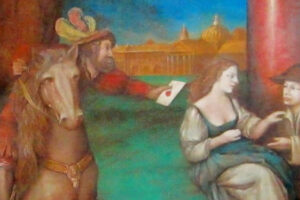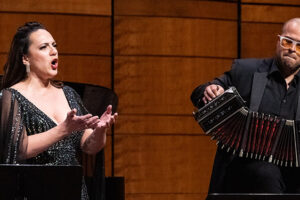
Verdi’s only successful comic opera, Falstaff, is notably hard to produce. Not only does it require an all-star cast of two sopranos, three baritones, three tenors, a bass, a mezzo soprano, and a contralto, but this cast need to be vocally and extremely comically talented as well.
It’s a feat to stage a Falstaff with all these qualities, but if you stage it right, it will be fantastic.
This is partly the case in the 2011 Zurich Opernhaus production of Falstaff. What we have here are first-class singers in a second-rate production.
Let’s start with the production, by Sven-Eric Bechtoff with sets by Rolf Glittenberg, which is quite appealing. While it’s not trying to bring back the grand court of Windsor with all of its wealth and riches, it does a great job at telling the story and in particular, making subplots take center stage.
Even though I liked the production, the direction it took was unclear. The costumes by Marianne Glittenberg (I’m sensing a connection here) seemed all over the place. We had Falstaff in more traditional looking clothes from the middle ages, then we have Alice alternating between 1950’s style dresses and 1800’s style gowns. The men are in trench coats sometimes and doublets other times. I noticed a newspaper prop specifying “Windsor News”, so I think the production was updated to the 1950’s.
The sets are charming at most times if a bit perplexing at others. There are tavern tables, then bleachers, then a huge curtain made of beads but it is all understandable without being distracting. The drama was set in a large, white “house” shape that fit nicely with the production. Lighting by Jurgen Hoffmann was boring and did little to enhance the story.
My favorite part of this production is the way it interprets the relationship between Nannetta and Fenton. For much of their duets and recitatives, the rest of the characters on stage are frozen, like they are suspended in time. Their love is the only true and real love in the opera and the fact that everyone freezes shows, for lack of a better expression, “Two crazy kids taking the world by storm.” It really highlights this part of the opera, making for a pleasant performance.
The only problem with this production is that it’s just not funny. Besides all the fat jokes and insults in the libretto, the production fails to use any physical comedy and does a disservice to Boito’s hysterical phrases. I enjoyed this production, but it didn’t work for the comic aspect of Falstaff, which is such a huge asset to the opera.
In fact, the only word that really comes to mind to describe it is “cute”. We have a cute production of a funny opera. Maybe this would work for something like La Sonnambula, but certainly not for Falstaff.
The hard-to-stage final scene of this opera is also a little perplexing in this opera. I’m not really an artistic person so I sometimes don’t understand little directorial choices, but I found it hard to understand. For example, in the forest, Alice is calling for Falstaff. Meanwhile, she and Falstaff are the only two people in the middle of the stage. Alice then goes and hides behind a weed, also in the middle of the stage, in plain view of the audience. I was perplexed.
In the vocal department, a fantastic cast has been assembled.
Ambrogio Maestri (who will sing Dr. Dulcamara for opening night at the Met in Elisir d’Amore next season) is the perfect Falstaff. It is easy to see that he will soon become the Falstaff of choice. (I’m expecting a new production at the Met season after next and that he will sing the title role). His long, lyrical and legato passages are sculpted to perfection as well as the enviable way that he interpolates comedy into his voice, creating a wonderful effect and a remarkable stage presence. His dusky and dramatic low notes are just wonderful and he is just fantastic an actor as he is a singer.
Falstaff has always been a caricature and he probably will continue to be. This doesn’t stop Maestri from creating a dramatic portrayal that is both emotional and intense, but still sticks to the comic element and lightness of the opera.
Barbara Frittoli sings a very charming Alice Ford. I am a big fan of hers as I really enjoy her voice but I have to admit she often lacks an element of excitement onstage that makes us love some other singers so much. Fortunately, this was not the case here as a very animated Frittoli bounced around the stage, tempted Falstaff and flipped wicker laundry baskets with force and vibrancy. Alice-a spinto role- doesn’t contain many high notes but Frittoli hit the high C in the finale perfectly. While her vibrato may feel a little uneven, her Italian diction is perfect.
Massimo Cavaletti gave a pleasant Ford, really capitalizing on the intense and angry feelings of the character and transplanting that to his music. He delivered a powerful and memorable “E’ sogno? O realta?” and confronted Alice with a fantastic vigor and strength.
As Nannetta, Eva Liebau gave one of the most lyrically beautiful performances I have heard in a long time. She floated notes with ease and the delicate nature of her voice fit perfectly into the part of a young girl in love. Her timbre seems very evocative of a singer like Lisette Oropesa.
Her lover Fenton, played by Javier Camarena was sweet voiced, agile, and charming as the two made what may be one of all of opera’s sweetest couples. They played off each other perfectly especially when they were caught inside the screen in a short rendezvous.
Meg Page, sung by Judith Schmid felt uninspired, but during the trio with Alice and Nannetta, she gave a fantastic and appealing performance. The Ms. Quickly of Yvonne Naef was perfectly sung and delivered in the most entertaining and comic way possible, making for a great performance. She reached low notes with ease and used her beautiful voice to an advantage.
The Bardolph and Pistol (Bardolfo e Pistola) of Martin Zysset and Davide Fresini lacked both the vocal and acting chops required of these supporting roles, making them the most disappointing in the cast.
With some of these performances on video, the orchestra seems to take back seat to everything onstage but when in the opera house, it’s much more a part of the drama. There was little focus or coverage of the orchestra which felt disappointing since it was so expertly conducted by Daniele Gatti.
This talented Verdi interpreter knew exactly when to give beautiful and swelling passages and when to hold back the powerful orchestra of the Zurich Opera House, in top form here. The Chorus of the Zurich Opera House under Ernst Raffelsberger was also superb, singing in almost perfect unison with crystal clear diction.
The production was filmed in HD with an NTSC 16.9 picture format but the quality is disappointing at times. Most noticeably, there is a short moment when the entire screen is blurred as the camera refocuses in a pretty intense dramatic moment. The sound which is consistently good during the performance is in PCM Stereo or DTS 5.0 which is great for picking up on Maestri’s deep and lusty bass notes.
The DVD, produced by Unitel Classics offers subtitles in Italian, English, German, French, Spanich, Chinese and Korean. It’s also region free, making it easy to play on the go. A bonus feature is a collection of short clips of other opera productions released under the Unitel Classica like the Andrea Chenier from Bregenz. The complete running time is 126 minutes.
























Comments